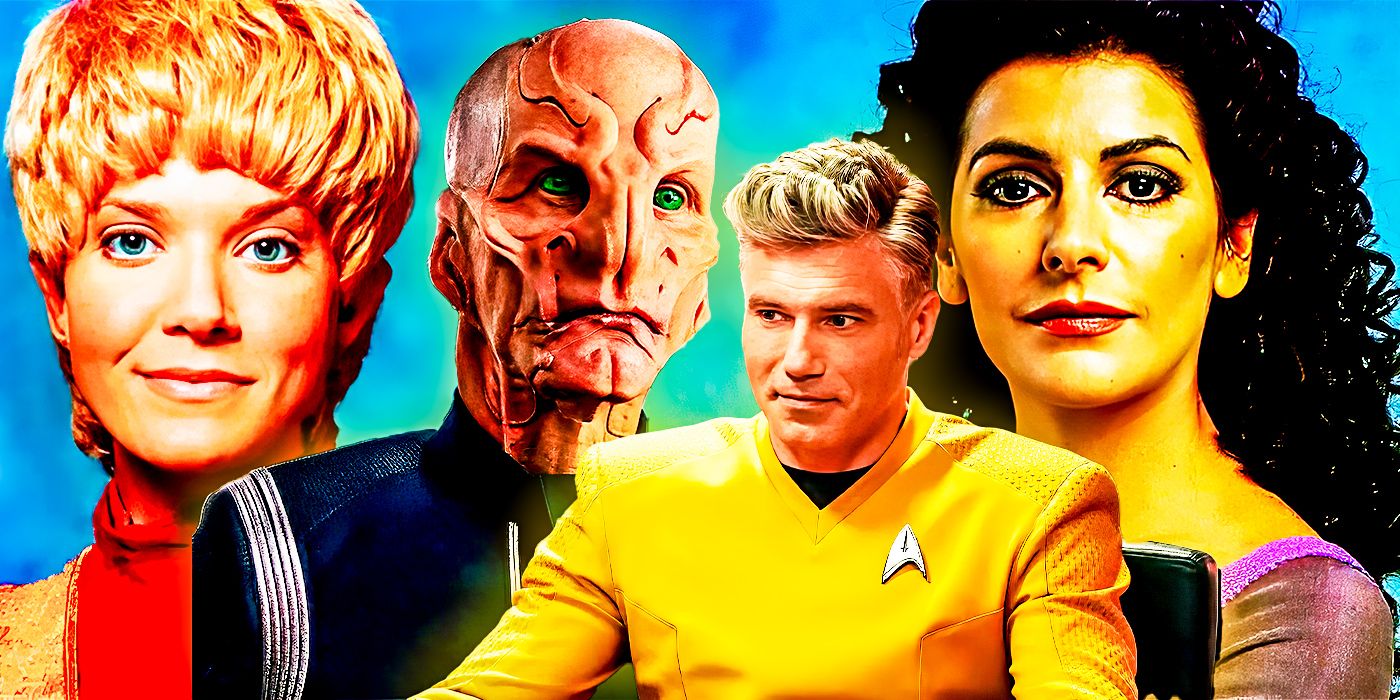
Summary
- Star Trek: The Next Generation and Voyager portrayed empathy as an alien superpower, hindering the development of empathic characters like Troi and Kes.
- Troi’s reliance on her Betazoid powers limited her ability to cultivate empathy as a skill, while Kes’ empathic abilities were overshadowed by her growing telepathy and psychokinesis.
- However, in Star Trek: Discovery and Strange New Worlds, empathy is redefined as a real-world, attainable skill demonstrated by human characters like Captain Pike and the empathic alien, Saru.
Star Trek‘s problem with empathic characters finds a solution in how it evolves as a concept in Star Trek: Discovery and Star Trek: Strange New Worlds. Star Trek: The Next Generation and Star Trek: Voyager portray empathy as an alien trait one step removed from telepathy, with Counselor Deanna Troi’s (Marina Sirtis) empathy manifesting as a diluted form of Betazoid telepathy, and Kes’ (Jennifer Lien) empathy eventually developing into telepathy and psychokinesis attributed to being Ocampa. The brand of empathy displayed by Captain Christopher Pike (Anson Mount) and Captain Saru (Doug Jones) on Discovery, however, doesn’t come from alien genetics.
Empathy is a core tenet of Star Trek‘s philosophy, with stories that demonstrate the importance of considering diverse perspectives. The best Star Trek characters should be able to model empathy, regardless of whether they’re human or alien, but TNG and Voyager took a human social skill and packaged it as something alien, and in doing so posited that empathy is an inscrutable superpower only a few possess. When empathy is portrayed as an alien power set instead of something real humans can actually do, it prevents empathic characters from actually showing empathic skills an audience can learn from.
TNG & Voyager Underutilize Troi and Kes as Empathic Characters
Deanna Troi and Kes’ Powers Got in the Way of Character Development
Star Trek: The Next Generation and Star Trek: Voyager underutilized Deanna Troi and Kes as genuinely empathic characters. Deanna can definitively sense others’ emotions thanks to her Betazoid powers, so Troi doesn’t need to cultivate empathy as a skill, and in fact admits in TNG season 4, episode 10, “The Loss,” that she hasn’t. Deanna’s exclusive reliance on Betazoid empathy means Troi can’t perform her duties as ship’s counselor without it. Likewise, Kes seems naturally empathic, but Voyager season 2, episode 10 “Cold Fire” sees Kes’ telepathy and psychokinesis grow stronger when Kes gives in to dark impulses, as though greater Ocampa powers evolve to replace mere empathy.
Kes and Deanna Troi’s powers hindered character development, but it’s important that Troi and Kes exist at all, given the era of TNG and Voyager‘s production. It was absolutely radical in the 1980s to feature a mental health professional on the Starship Enterprise, and Kes’ kindness portrayed as strength instead of weakness was unusual for a sci-fi show in the 1990s. While Troi gets a shortcut to understanding others’ emotions through her Betazoid empathy, and Kes’ latent empathy is forgotten in favor of a more interesting power set, both were so ahead of their time that empathy had to be an alien superpower instead of a demonstrable skill.
Star Trek Sheds Its Fear of Empathy With Discovery & Strange New Worlds
Captain Christopher Pike and Captain Saru Model Real-World, Attainable Empathy
In Star Trek: Discovery and Star Trek: Strange New Worlds, empathy is wholly redefined. Discovery season 2 sees Captain Christopher Pike demonstrate very human empathy as a compassionate and confident leader who cares deeply about each individual member of his crew; a trait he carries over to the Enterprise in SNW. Discovery‘s empathic alien Captain Saru has naturally heightened Kelpien instincts, but Saru is an emotional anchor and wellspring of kindness independent of alien abilities. Saru’s recognition of fellow Kelpien Su’Kal’s pain in Discovery season 3 solves the mystery of the Burn, and Saru actively connecting with Su’Kal is an important step in restoring the greater connections of the Federation.
Star Trek: Discovery and Star Trek: Strange New Worlds are as much a reflection of the present as Star Trek: The Next Generation and Star Trek: Voyager were of their times. Pike and Saru can demonstrate that empathy is a real-world skill because of the normalization of emotional health in 21st-century society, just like Troi’s presence in TNG reflected growing awareness of mental health care in the 1980s. As society as a whole recognizes empathy as a very real human ability, and not a trait that has to be packaged as an alien superpower, Star Trek follows suit to integrate that recognition into its aspirational version of the future.





